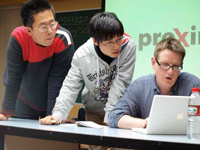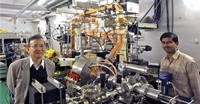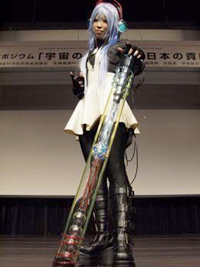 |
|
|
 |
Preparing future detector R&D at testbeams
This month's Research Director's Report was written by François Richard, co–chair of the Worldwide Study, regional detector contact for Europe
 Picture showing Roman Poeschl, organiser of the testbeam workshop, in a training session with future ILC users
Picture showing Roman Poeschl, organiser of the testbeam workshop, in a training session with future ILC users
|
Testbeams are the first occasion for detector concepts to face the truth about their design, and an optimal opportunity to train young physicist on real data. Recently, 40 experts (two from Asia, five from North America and the rest from Europe) met at the Laboratoire de l'Accélérateur Linéaire (LAL) at Orsay to review the needs for testbeams for the R&D on detectors in the future. The goal of this workshop was to collect the needs and to coordinate the activities of the various collaborations active in the field: CALICE, FCAL and SiD groups on calorimetry, LCTPC on gaseous tracking as well as SiLC for the various silicon tracking devices. Representatives of the current major test beam facilities, CERN, DESY and Fermilab, presented their sites and actively took part in the discussions. Many other facilities available in the world were discussed: J–Parc, IHEP Bejing, Tohoku, KEK in Asia, IHEP/Protvino, Dubna in Russia, and it was noticed that SLAC would restore test beams and create a new facility in its end station A by 2010. The successful testbeam efforts prior to the Letters of Intent (LOI) for detectors were reviewed followed by vivid discussions on what is needed to improve these testbeams for the next phase.
Read more...
-- François Richard
Research Director's Report Archive
|
 |
|
|
 |
|
 |
Developing new tool for hospitals and life science

The project leader Junji Urakawa of KEK (left) and Abhay Deshpande of SAMEER, India (right) standing beside the test laser–Compton X–ray source in the accelerator test facility (ATF) at KEK. |
The Quantum Beam Project, a year–old project to study and utilise the quantum nature of particle beams at KEK, is developing a commercial version of a new affordable, compact X–ray source. The aim of the project is to develop a compact and high-quality particle source for broad commercial use in medicine, life science, information technology, nanotechnology, and quantum science. The project's name, Quantum Beam, refers to beams of particles like neutrons, photons, and ions, which exhibit quantum mechanical behaviours, and the unique feature of the project is to take advantage of this nature to promote the technology transfer of an affordable compact X–ray source to hospitals and research institutions.
Read more...
-- Misato Hayashida |
 |
|
|
 |
From CERN Bulletin
16 November 2009
Half way round the LHC
"The LHC operations teams are preparing the machine for circulating beams and things are going very smoothly. ..."
Read more... |
|
From Physics Central
13 November 2009
Buzz Blog – Nobu Toge: Machine Portraits
"... A high–energy physics laboratory might seem an unlikely muse for a photographer. But just a glance at a few of Toge's photos might convince you otherwise. ..."
Read more... |
|
From Der Freitag
13 November 2009
Das Universum voller Geigen
Er hat die String–Theorie miterfunden und wurde gerade zum Nachfolger von Stephen Hawking ernannt: Aber kennt Michael Green die Antwort auf letzte Fragen der Physik?
Read more... |
|
|
 |
The Spallation Neutron Source at Oak Ridge

Stuart Henderson celebrates SNS achieving 1 MW beam power |
In planning for a new large initiative like the International Linear Collider, it is important to learn as much as possible from existing projects that have relevance. In that spirit, we have invited presentations from other projects at our large workshops. At the American Linear Collider Physics Group workshop at Albuquerque (ALCPG09), we had a very informative presentation by Stuart Henderson of Oak Ridge on "The Spallation Neutron Source (SNS) Linac: Performance and Operational Experience." The SNS is the most powerful proton linac in the world and uses similar technologies to those proposed for the ILC.
Read more...
-- Barry Barish
Director's Corner Archive |
 |
|
|
 |
|
The future visits Japanese accelerator symposium

This is Lina (pronouced Lai-na), the fanciful scientist from a future particle physics laboratory created by Masumi Chato for her graduation project. Masumi is a student from Tokyo Kasei University, a member of the Advanced Accelerator Association promoting science and technology.
|
|
arXiv preprints
0911.3314
Review of Linac-Ring Type Collider Proposals
0911.2897
Higgs boson production in photon-photon collision at ILC: a comparative study in different little Higgs models
0911.2304
Higgs mediated flavor violating top quark decays τ → uiH, ui γ, μi γ γ, and the process γ γ → τc in effective theories
0911.1892
Neutrino phenomenology and unparticle physics
|
|

